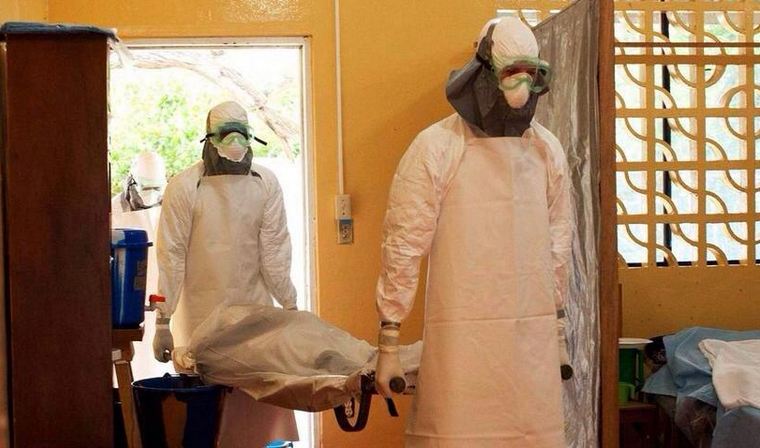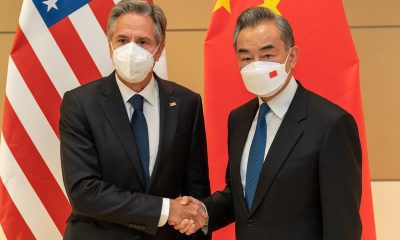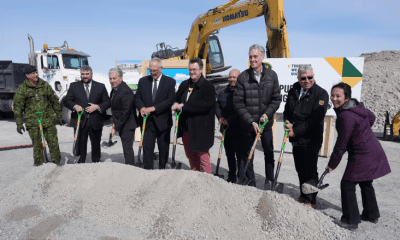Breaking
Lousy pay, tough conditions: Health care workers needed for Ebola response

Africa continues to suffer more loss as Ebola outbreak continues. Photo courtesy of Dr. Kerem Kinik (@drkerem) on Twitter.
TORONTO — The pay is a pittance, the conditions are gruelling, and the personal risks are all too real.
The need for international health-care workers to help in the response to West Africa’s Ebola outbreak is enormous and pressing. But make no mistake — this is tough, tough work that people are being asked to volunteer for — and dangerous.
That fact was driven home tragically over the weekend with the announcement that a British nurse and a Senegalese epidemiologist have contracted Ebola while working in Sierra Leone, one of three countries battling the disease.
Dr. Rob Fowler knows the scenario all too well.
A critical care specialist at Toronto’s Sunnybrook Health Sciences Centre, Fowler has done a pair of month-long stints in West Africa since the outbreak appeared on the world’s radar in March.
A veteran of Toronto’s 2003 SARS outbreak, Fowler has practised his profession in difficult and dangerous circumstances. But the Ebola work, well, that’s a whole different level of tough, he said in a recent interview.
“This is the hardest thing I’ve ever done, I would say, in any of my clinical experiences,” Fowler, a quiet man, says in a matter-of-fact tone.
“That’s not to say that SARS wasn’t difficult … for everyone involved. However this is a different order of magnitude.”
He describes working in Kenema, Sierra Leone’s third largest city. Located in the east of the country, near its junction with the other affected countries — Liberia and Guinea — Kenema has been a hot spot for Ebola infections.
A fourth country, Nigeria, has reported about 16 cases, all linked to a man who brought the virus from Liberia. The hope is that Nigeria can stop transmission before it spreads out of control.
For more than a decade, the international aid group Medecins Sans Frontieres (Doctors Without Borders) has operated treatment centres when Ebola outbreaks occur. They have the most experience delivering this dangerous care, and the world has been happy to rely on their expertise.
MSF, however, has said it cannot open another treatment centre at Kenema because it`s already stretched beyond its limits.
Fowler has spent the past year at the World Health Organization as a volunteer, working for $1. He helped the organization draw up standard research protocols that could be rapidly put into use during disease outbreaks.
When Ebola hit, he was deployed to West Africa through the WHO’s global outbreak alert and response network, known as GOARN. On his second mission, he found himself at Kenema, trying to treat an ever growing number of Ebola patients.
Fowler was there when Sheik Umar Khan, Sierra Leone’s leading Ebola expert, contracted the disease. Khan was his country’s only virologist, and also the only doctor working at the Kenema Ebola unit.
“And with his sickness and death, you have zero pre-existing doctors there. And so the only doctors that are there are the ones that have gone under WHO GOARN contracts for $1 a contract, and you have very, very few nurses that remain … a relatively small number of very dedicated nurses,” Fowler explains.
“You have 60, 70, 80, 90 patients. And so, if you’re one of two or three doctors and 90 patients, of whom many are sick, you can imagine that would be unthinkable in Toronto.”
“The sky would fall in. And in Kenema, that’s just the daily reality.”
The daily routine was challenging and long. Fowler says days started with a morning meeting at 7:45 a.m. where they’d learn who had died and who had tested positive. Then the meticulous process of getting into the all-important PPE — personal protective equipment — would begin.
Fowler would spend four to five hours in the stifling, spacesuit-like outfit, hanging bags of intravenous fluids, doling out medicine, delivering food and water to patients who couldn’t get out of bed, and providing whatever care he could.
At a point, he says, he would hit his limit and have to leave, shedding the equipment carefully so as not to become infected through contact with the exterior of a soiled suit. After rehydrating and getting a bite to eat, it was time to climb back into the gear and go in for another stint.
Eat. Sleep. Repeat. Seven days a week, typically for three or four weeks at a stretch.
“I’ve found, and I think most people would find this, that with the schedule we’ve kept anything more than four weeks is probably just pushing your limits,” he says.
“It’s not an environment where it’s good for people to be tired and not on their game. Because you really have to be so careful and so vigilant at really every moment that you’re inside the facility in order to prevent risk to yourself.”
The WHO says there have been more than 2,600 cases so far in this outbreak — more than all previous known cases of Ebola combined. Of those, 225 have been health-care workers, and at least 130 of them have died.
Last week MSF put out a call for doctors, nurses and water and sanitation experts, as well as people trained in tracing contacts of cases.
“We have 1,086 staff operating in these countries and we have just opened a 120-bed treatment centre in Liberia’s capital, Monrovia, making it by far the largest Ebola centre in history,” Dr. Joanne Liu, MSF’s international president wrote in a commentary published in Time magazine.
“But it is already overwhelmed with patients and we simply do not have additional response capacity. Others must enter the breach.”
The organization pays more than GOARN — around $1,907 a month, depending on experience. But that’s a far cry from what medical professionals are generally paid.
GOARN too is looking for extra health-care workers to send to the region. Fowler, who recently finished his second mission, is currently screening applications and putting out the word.
The WHO has had hundreds of responses to its call for help, he says. But the agency is being selective, looking for people who have the right mix of expertise, interpersonal skills and maturity. Fowler says it’s a very tough environment for people who aren’t used to being there.
“It is a challenge in finding not just bodies, but more specifically, skilled and appropriate and available personnel — all organizations are still actively soliciting people to contribute,” he says, warning “this outbreak will not be fading anytime soon.”





















